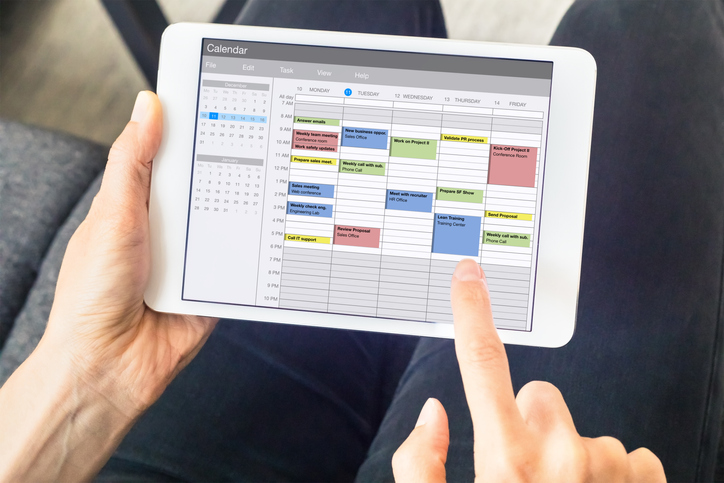So here we are in 2022. And if you made New Year resolutions then, like most people, they may rapidly be disappearing into obscurity. All those good things you were going to be, and do, no longer seem possible.
To top it all, today is Blue Monday, supposedly the most miserable day of the year.
But wait! It’s not too late to restart 2022. We are only halfway through January so there is still time to make a difference.
We know you’re busy. So in this article we share some tips that will actually help with that. How you can work smarter without having to work any harder.
Sounds too good to be true? Let’s take a look . . .
Plan your day
Whether you are office-based or working from home, start your day by making a plan. Yes we know it will get interrupted and will look at that next.
It’s now thought that most people can only focus on around four things at once. Working memory describes the information we are able to pay attention to and manipulate. Early research on working memory indicated that for most people, working memory could contain around seven items, but this is now thought to be closer to three or four.
So when making your To Do list for the day, think hard about your real time priorities. It is better to start off with a list of perhaps four key things. By all means have all those other things on a separate list, which you can move onto if you have time. But if you focus on four key priorities you are more likely to make progress.
When planning your day, also have a clear idea of the time you intend to finish work. If you don’t do this, you can easily fall into the trap of keeping going for “just a few more minutes” until you finish something. Which you probably won’t anyway. Draw the line and come at it fresh tomorrow instead.

Manage interruptions
One of the most frustrating things about work is other people. All you want to do is get on with the task in hand but you seem to be constantly interrupted. Whether these interruptions are from clients, colleagues, or family and friends if you are working from home – they can totally decimate your day.
Here are three things to try:
- Divide your working day into blocks of time. Ensure there are a couple of these blocks where you simply won’t let yourself be interrupted. Whether you make this public to others or just ignore everyone is up to you. But set some time aside to do this.
- Ensure you find an appropriate space for your uninterrupted time. If you are office-based, could you hide in a conference room or cafeteria? If you work from home, don’t try to do this in the main living area as you will be inviting constant interruption. If there really is no other space in the home, consider going to a local library or coffee shop for your focussed work time.
- Be proactive rather than reactive. If someone interrupts you – particularly if this is a persistent trend – fix a more convenient time to talk with them rather than feel you have to respond to their needs immediately.
Chunk your time
We just referred to dividing your day into chunks, and many people find this helps their productivity in various ways. The Pomodoro technique became popular in the late 80’s. Think of it as similar to HIIT (High-Intensity Interval Training) in which you put in intense bursts of 100% effort exercise, interspersed with less intense and recovery activities.
The Pomodoro technique suggests that you split your working day into 25 minute chunks with a 5 minute break in between. So, for example, the first couple of hours of your day could look like:
25 minutes – planning your day and answering urgent emails
- 5 minutes – break.
- 25 minutes – first intense work slot.
- 5 minutes – break.
- 25 minutes – phone calls.
- 5 minutes – break.
- 25 minutes – second intense work slot.
And so on throughout the day.
The length and content of your time slots will obviously vary to suit your commitments and circumstances but it is definitely worth considering chunking and planning your time rather than just ploughing in and trying to do too many things at once.

Take regular breaks
As we have just seen, short regular breaks are built into the Pomodoro technique. But however you organise your time, and wherever you are based, it’s important to have regular breaks. Even just a couple of minutes away from the screen to clear your head and stretch your legs will help to refresh you. If you don’t do this, your productivity will dip after a while and you won’t get as much done.
If you work from home you could use these mini breaks as opportunities either to catch up with a quick domestic task, a nice coffee, or something more indulgent such as painting your nails or doing a Sudoku.
It’s also important to take a longer break for lunch and have something decent to eat. Even if you can only grab 15-20 minutes, try to get some fresh air and have something healthy to eat away from your desk if possible. Continuing to work whilst shoving a processed sandwich into your mouth is not going to do you any good.
And when you finish work for the day, try to find ways to draw a line under your working day. If you’re office-based, aim to leave at a reasonable time and come back to it all in the morning. If you’re working from home, establish a winding-down routine so that you switch work off and home on.
Keep meetings brief
Meetings Bloody Meetings was the title of a 1970’s training film made by John Cleese. Asked why he brings work home instead of doing it at work, he explains that he is too busy to do work at work because he has to go to meetings. Sounds familiar?

The Covid-19 pandemic brought most face to face meetings to a halt. Which made many of us breathe a sigh of relief. But they have now been replaced by Zoom meetings, and Teams meetings, and all kinds of other online meetings. Which can take up just as much time.
Yes, sometimes meetings are necessary, whether face to face or online. But make meetings count. Every time you are either setting up a meeting or are invited to one, ask yourself whether it is really the most effective way of getting things done. And if it is, ensure that everyone is briefed and fully prepared well in advance to save time being wasted going through information that people should already know. There needs to be a clear time limit and a viable agenda.
Keep notes
A key to working smarter is to always keep notes. Meetings are one example, as it is very easy to forget exactly what was agreed and rely on someone else’s minutes. But notes are also incredibly helpful for:
- More background information on something you don’t understand very well.
- Step by step details of how to do a technical task that you don’t have to do very often.
- Creative ideas and thoughts not relevant to a current project but which could be useful in future.
How you organise your notes is up to you, but as you develop your notes system you will find it saves a lot of time if you can refer back to information rather than having to research it all over again.

Organise as you go
As well as your notes system, you will really benefit from organising yourself as you go. In reality you are never too busy to do this – even though it feels like it – because if you don’t do it as you go along, you will have to spend a frustrating chunk of time at some future stage. And will probably waste a lot of time before then looking for things you can’t find.
So why not use one of your chunks of daily time to keep on top of the minutiae of working life? For example:
- Filing paperwork.
- Filing digital documents and images.
- Moving emails to relevant folders.
- Binning unwanted emails.
- Logging hours and expenses.
Just a few minutes a day can save hours of frustration later. If you know you’re horribly behind on all this, then start afresh now with today’s stuff, and also spend 5 minutes getting a few older items up to date too. If you can do this every day from now on, you will gradually get up to date.
Ask for help
We can waste a lot of time trying to do something we don’t know how to do. Sometimes it can be kind of fun trying to work something out, but if you are up against deadlines there are better uses for your time.
So there are times when you need to swallow your pride and ask someone who knows. You could easily waste hours trying to work out how to do something in a particular type of software or computer system, when someone else could show you in a couple of minutes.

Share tasks
On the subject of asking for help, be proactive at offering your help too. Particularly if you are working from home, it’s good to have some collaborative contact with your colleagues during the day.
You might also want to try and trade tasks with someone else. For example if you’re really good at putting together presentations and they are amazing at spreadsheets, you could potentially help each other out and both get things done more quickly.
Keep learning
Last but not least, one key aspect of working smarter is to keep learning. It can be easy – particularly when working remotely – to get stuck in a bit of a rut workwise. Always remember you have a career not just a job. So, whatever you are doing, always be looking out for opportunities to get better at how you do things and how you can expand your skills.
Set aside time to network with relevant others as much as possible, both remotely and – where possible – going along to networking and training events. Keep up to date with trends in your sector and do online courses in skills you would like to learn. Also think further ahead to where you would like your career to go, and the skills you need to acquire to make that happen.
And don’t neglect learning new things that are not directly job-related. For example, if you’ve always wanted to speak Spanish, play the piano, play chess or know how to salsa dance then why not? Learning anything new keeps our minds active and lifts our spirits, both of which will then benefit our wellbeing at work.
So if you want to make 2022 the year when you work smarter nor harder, we hope that these tips will help you do just that. Check back soon with us at Xcite Digital for lots of useful tips about the weird and wonderful world of digital marketing.
